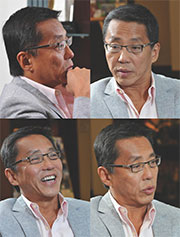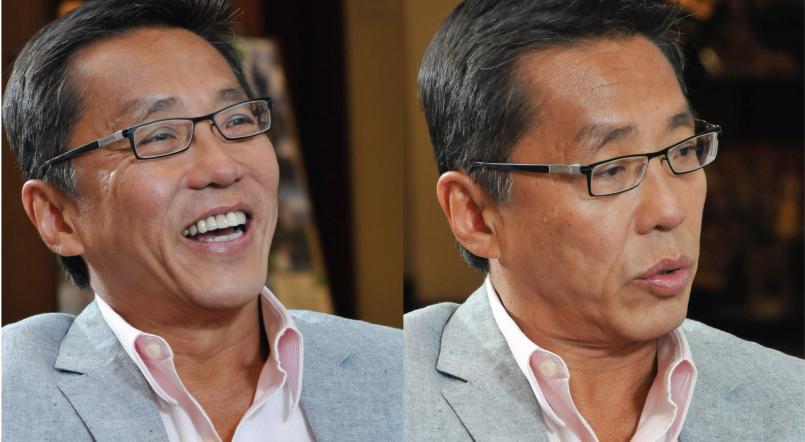1. THE DIFFERENCE BETWEEN MANAGEMENT & LEADERSHIP
Some would define leadership as “getting things done through other people”. I disagree. That is management, not leadership. If you are going to be a leader, you need to transform people’s lives. When you ask people about political or religious leadership, they say that good leadership helps transform lives. When you ask people about business leadership, they say it’s about maximizing shareholder returns. Business leadership is not all that different from other types of leadership – there must be a transformational aspect.
2. A PREREQUISITE OF LEADERSHIP
It is only when you empathise with people that you can begin to lead them. This is something that young leaders today need to know. You can take a young high-flyer and you can “hothouse” him all the way to the top. You will produce an excellent technocrat. But you will not create a good leader. Empathy is not required for good management, but it is absolutely essential for leadership. I have been in a position where I had despaired about my own life. I have the ability to empathise with the despair of others because I have “been there”.

3. WHAT DRIVES YOU?
This is the Asian century, and you are seeing tremendous growth from Asia. You will also see the rise of great Asian brands, as they expand across the world. I would like Banyan Tree to be part of that journey. I love the architecture and the design of our buildings. But at the end of the day, you are just building these soulless castles. It is our people that drive me and keep me going. When I go around to all our hotels and I see young people just starting out with their lives – this inspires me. Our journey is just beginning – the journey to use Banyan Tree as a vehicle to stimulate development, and provide livelihood for people.
4. THE VISION OF AN ENTREPRENEUR
If you are heading up a large multinational that has been around for hundred years, you don’t have to talk so much about the vision and passion because you are essentially trying to grow the company a little bit more while you are there for five years (which is the average lifespan of a CEO). But when you start your own business, or you are the next person to take over, then vision and passion is critical because there is not yet a strong, established tradition and culture.
5. COMFORTABLE NOWHERE, COMFORTABLE EVERYWHERE
I have been an outsider my whole life. I have no comfort zone. I grew up in Bangkok, but was always the foreign kid. I spoke a bit of the language, but was never accepted as a local by the Thais. I came to Singapore at a relatively old age, so I don’t have childhood friends from secondary school. This is a disadvantage that I’ve tried to turn into a strength. You will find, for example, that a person who was born and bred in Singapore will have a Singaporean mentality. He probably will find it difficult to operate in Mexico. Mexico and Singapore are equally strange to me. I’m comfortable nowhere, and so I’m equally comfortable everywhere.
I love the architecture and the design of our buildings. But at the end of the day, you are just building these soulless castles.
6. I NEED YOU TO DISAGREE WITH ME
That is a challenge, partly because of my personality which as my wife and children tell me can be very dominating. So I try to tell my closest colleagues, who have been working with me for many years, who know my temperament and my personality, that I need their feedback and that I need them to disagree with me. I can’t help that my personality is dominating, or that I am short-fused. What I can do is to tell my colleagues “This is my personality, forgive me for it. Please know that I need your feedback, and I need you to disagree with me”. And thankfully, some of them have indeed given me good feedback.
7. BE TOUGH – BE EMPATHETIC
My advice to young leaders? You have to be tough, ambitious, and have a good deal of self-confidence. You have to ask “why?” and not take things at face-value. Leadership is by definition elitist. You have to believe you should lead, that you possess attributes that others do not have. That is why it so important to develop that instinctive empathy early – to mitigate that inherent elitism.
8. BANYAN TREE AFTER ME
I would say that for catastrophic succession, we are well insured. If I were to die tomorrow, Banyan Tree would not have a problem for the next five years. The longer term issue of what happens to Banyan Tree in 20 years’ time is always going to be a challenge. My two children are in junior positions in the company. I am very clear that they should not have this as a burden, and neither is it their birth right. My children may not want to continue doing this business, they may want to sell it and do something else. But if that happens, I still have a strong responsibility to the people at Banyan Tree who believed the brand story I have been selling them; to whom I have been telling that this great culture of Banyan Tree ought to continue, even when the family is not involved anymore.
9. GIVE BACK
“A capitalist in my pocket and a socialist at heart” – this is how my wife has described me. But how does this translate to what we do at Banyan Tree? We have always had a strong commitment to Corporate Social Responsibility, even before the term was conceptualised. I don’t have an MBA, I didn’t go to Business School, I was a developmental economist and this remains my main interest even today. I’m interested in resort development because it is a vehicle through which I can carry out the ideas I had as a developmental economist. Although we are a luxury resort, I’m not interested in things like crystal chandeliers or the thread-count of our bed sheets. What I am interested in is how our resort can really be an impetus for social, cultural and economic change.
This article was first published in HQ Asia (Print) Issue 02 (2011)


